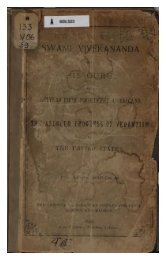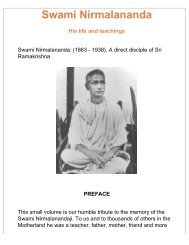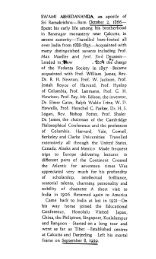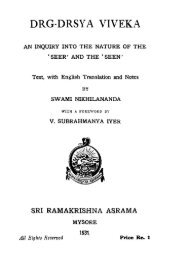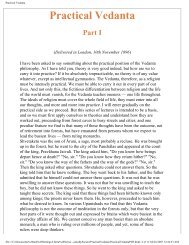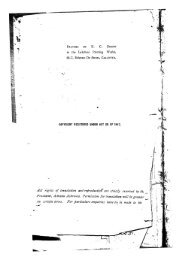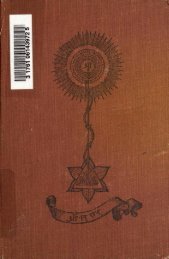Swami Vivekananda - A Biography by Swami Nikhilananda
Swami Vivekananda - A Biography by Swami Nikhilananda
Swami Vivekananda - A Biography by Swami Nikhilananda
Create successful ePaper yourself
Turn your PDF publications into a flip-book with our unique Google optimized e-Paper software.
the supremacy of reason, preached against the uncritical acceptance of scriptural<br />
authority, and strongly supported the slogans of the French Revolution. The whole<br />
movement was intellectual and eclectic in character, born of the necessity of the times;<br />
unlike traditional Hinduism, it had no root in the spiritual experiences of saints and<br />
seers. Narendra, like many other contemporary young men, felt the appeal of its<br />
progressive ideas and became one of its members. But, as will be presently seen, the<br />
Brahmo Samaj could not satisfy the deep spiritual yearning of his soul.<br />
About this time Narendra was urged <strong>by</strong> his father to marry, and an opportunity soon<br />
presented itself. A wealthy man, whose daughter Narendra was asked to accept as his<br />
bride, offered to defray his expenses for higher studies in England so that he might<br />
qualify himself for the much coveted Indian Civil Service. Narendra refused. Other<br />
proposals of similar nature produced no different result. Apparently it was not his<br />
destiny to lead a householder's life.<br />
From boyhood Narendra had shown a passion for purity. Whenever his warm and<br />
youthful nature tempted him to walk into a questionable adventure, he was held back<br />
<strong>by</strong> an unseen hand. His mother had taught him the value of chastity and had made him<br />
observe it as a matter of honour, in loyalty to herself and the family tradition. But<br />
purity to Narendra was not a negative virtue, a mere abstention from carnal pleasures.<br />
To be pure, he felt, was to conserve an intense spiritual force that would later manifest<br />
itself in all the noble aspirations of life. He regarded himself as a brahmacharin, a<br />
celibate student of the Hindu tradition, who worked hard, prized ascetic disciplines,<br />
held holy things in reverence, and enjoyed clean words, thoughts, and acts. For<br />
according to the Hindu scriptures, a man, <strong>by</strong> means of purity, which is the greatest of<br />
all virtues, can experience the subtlest spiritual perceptions. In Naren it accounts for<br />
the great power of concentration, memory, and insight, and for his indomitable mental<br />
energy and physical stamina.<br />
In his youth Narendra used to see every night two visions, utterly dissimilar in nature,<br />
before falling asleep. One was that of a worldly man with an accomplished wife and<br />
children, enjoying wealth, luxuries, fame, and social position; the other, that of a<br />
sannyasin, a wandering monk, bereft of earthly security and devoted to the<br />
contemplation of God. Narendra felt that he had the power to realize either of these<br />
ideals; but when his mind reflected on their respective virtues, he was inevitably drawn<br />
to the life of renunciation. The glamour of the world would fade and disappear. His<br />
deeper self instinctively chose the austere path.<br />
For a time the congregational prayers and the devotional songs of the Brahmo Samaj<br />
exhilarated Narendra's mind, but soon he found that they did not give him any real<br />
spiritual experience. He wanted to realize God, the goal of religion, and so felt the<br />
imperative need of being instructed <strong>by</strong> a man who had seen God.<br />
In his eagerness he went to Devendranath, the venerable leader of the Brahmo Samaj,<br />
and asked him, even before the latter had uttered a word, 'Sir, have you seen God?'<br />
Devendranath was embarrassed and replied: 'My boy, you have the eyes of a yogi. You



